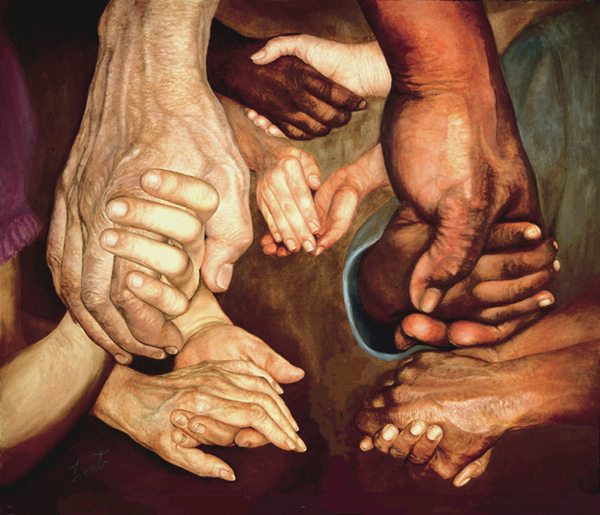Love in the Time of Covid-19
Never thought I’d be standing at a baker’s bench. Never thought I’d be up to my wrists kneading dough. Never thought I’d be driving a delivery van to multiple locations giving out bread. But here we are in this not-quite dystopian world of pandemic and sequestration. Nothing like a plague to get the attention of the world. And yes, I ripped off the title of my piece from Gabriel Garcia Marquez’s great novel, “Love in the Time of Cholera;” an excellent addition to one’s literary life experience.
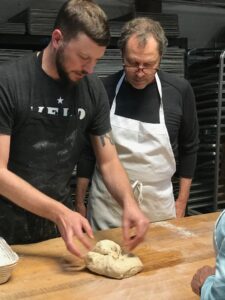
Kay and I were in New Zealand in mid-January when we became aware of Covid-19 shutting down Wuhan, China. It was surreal, because the Chinese were celebrating their New Year, and we kept seeing busloads of tourists from China going about the Queenstown sites and landscapes snapping photos and seeming to enjoy themselves. Most of the tourists had their faces covered by masks.
I had two pleasant encounters with tourists from China both on the same day: 1) While on a solo trek in the mountains, I had under-estimated my arrival at the rendezvous point to be picked up. I had over an hour of hiking left, well beyond the time to meet the family. I had my daughter’s phone number (Having flunked Boy Scouts, I am always just “mostly” prepared), and asked a young woman I met on the trail if she could call a New Zealand number. She was quick to oblige, and even dialed the number for me. I was able to contact my daughter before the family left the house and delay our meeting time.
And 2) As I was approaching the end of my nineteen mile hike, I met two young Chinese women who had just gotten off their tourist bus. They were beginning an ascent up the mountain, one in sandals and the other in pink, Croc-like shoes. They stopped me with a wave and asked how long it would take them to hike the first couple of miles. We struggled to communicate in broken English, but I tried to explain how deceiving this path was: a pleasant start at the trail head that quickly turned steep and strenuous. Then pointing to their shoes, I tried to explain that their footwear was not right for this trail. They seemed to understand by nodding their heads, and we smiled as we parted.
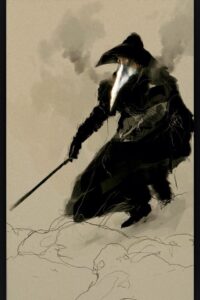
These three tourists were sans masks which allowed for clarity of gesture and expressions of gratitude and concern. While our conversations were brief, I was shown kindness in the first encounter, and passed on what I hope was kindness in the second encounter. When Kay and I got home in early February, the world was beginning to wake up to the potential destruction of the Covid-19 plague.
In mid-March we were hit by some shocking news: our New Zealand kids were in a nation-wide lock-down, the status of their visas and employment now in limbo; our Chattanooga kids had to layoff twenty-seven employees at their bakery. While we were thankful that no one was sick with coronavirus, these very personal micro-scenarios were a close-to-home economic picture of the uncertainty of what the whole world now faced.
When the plague became pandemic the first word that came to mind was “barren.” From the airports to the grocery shelves. When Kay and I flew back into Los Angeles from New Zealand, we waited in line among the multitudes for over an hour just to have our two-minute interview with a Customs Agent. Lucky for us, we had enough time to catch our connecting flight to Nashville. At present, the lines at airports are nonexistent.
Many of the shelves in the grocery stores are also barren. Regardless of one’s income bracket, people are stocking their Plague Pantries with supplies to protect against the unknown, the unseen, and the unexpected. When we humans are unable to hold the chaos at bay, then stuffing our Plague Pantries to overflowing may be our last and only action that gives us a false sense of being in control. Community is swallowed up by the conscienceless process of survival of the fittest. It is a terrible feeling to stare at an empty cupboard.
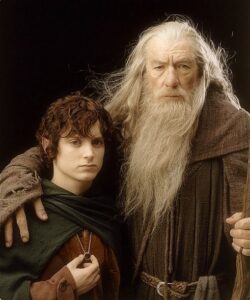
In a time such as this one I am reminded of a moment in the first volume of “The Lord of the Rings” when Frodo and Gandalf have a brief exchange about the perilous quest they share: “I wish it need not have happened in my time,” said Frodo. “So do I,” said Gandalf, “and so do all who live to see such times. But that is not for them to decide. All we have to decide is what to do with the time that is given us.”
There was little comfort we could offer our New Zealand kids other than encourage their hearts and do what we could to help make it possible for them to return home if they decided to do so once the lock-down was lifted. Our Chattanooga kids were a different story. The city had deemed their bakery “essential,” so bread had to be baked, now with twenty-seven fewer employees. They had a skeleton staff to work during the day for the pickup orders and local deliveries, but for larger orders, extra hands were needed.
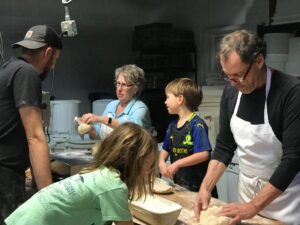
And that is how we found ourselves at the baker’s bench. My grandson asked his father why the baker’s bench was so long, and he replied that it took many hands to prepare the bread dough for baking. The heartbreaking fact was the professional team of bakers that once formed the assembly line along the baker’s bench were now in the long virtual lines of the unemployed. The larger orders for bread had to be filled after hours and by unprofessional hands. So four adults and two bratlings (“bratling”; singular possessive – a term of endearment coined by Uncle Tad to refer to all his nieces and nephews under the age of ten; whenever two or three are gathered together we have a conference of “bratlings”), took up positions along the baker’s bench and went to work.
I have this mental picture of Covid-19 being like an unmanned fire-hose swinging wildly about randomly spraying a poisonous trajectory in every direction. Some are hit with its full force while others are only covered in a light mist. Nearly every human will be effected in a personal way by Covid-19 before the disease has run its course. The secret and shadowed parts of our souls will be revealed in the heat of this crucible; blame and shame will go to the deserving, but from what I have witnessed so far, most people are responding with a unified grace and dignity and a desire to help one another.
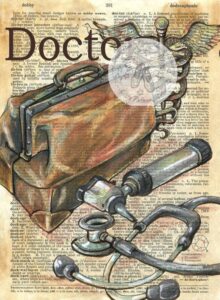
The medical communities and other first-responders are glorious examples of bravery and sacrifice. These are the big heroes of the hour with no superpowers other than their human skills and personal dedication to serve us in the face of great odds. They are deserving of our praise and honor, prayers and encouragement. We should all take note, take heart, and have hope.
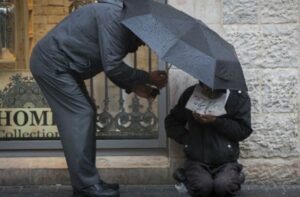
While most of us can’t be in the vanguard of providing healing and comfort to the stricken, we can in this time, begin to think less of ourselves and more of others. Great disasters open wide the existing fractures of our society, and in these situations, we all experience some level of personal distress. In this unifying moment, we are offered opportunities to show simple acts of kindness, generosity, and compassion toward one another, those little “cup of cool water” offerings that often go unseen boosting the morale of the world with demonstrations of love to our neighbor.
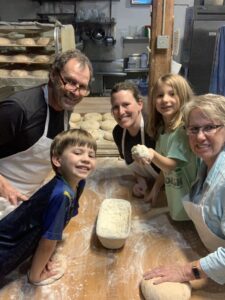
Cover Art: Compassion Hands by Ringo Turchin of Tuchin Jewelry

